By Tom Travis
Flint area Ukrainians are urgently contacting friends and relatives still in the embattled country and say they feel hopeless, helpless, sad, and angry.
Flint resident Linda Pylypiw, of Ukrainian and Latvian heritage, said she believes the Russians are “once again trying to crush the spirit of the Ukrainians and not treat them like a separate people but as the unwanted step-children of the Russians.”
A local attorney, Pylypiw has a first cousin in Ukraine. The cousin has two children in their 30s who live in Kyiv. Pylypiw said she received notice from the children that they have fled from Kiyv and are now living with their father. Pylypiw said she feels a great sense of helplessness.
Marie Zuk, a retired assistant junior high school principal in the Carman-Ainsworth district, talks with her cousin every day in Lviv, in western Ukraine. “It breaks my heart,” Zuk said, about seeing the pictures on the news of the Ukrainians seeking shelter in the subways.
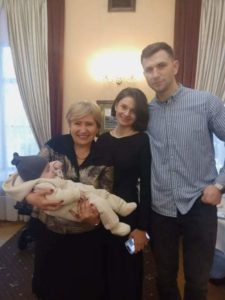
Marie Zuk’s cousin (left holding baby) with other family members living in Lviv, Ukraine. (Photo submitted by Marie Zuk)
Zuk had the news on while she was talking to EVM. When she saw a child eating a cookie, she got emotional, reiterating, it “breaks my heart.”
Mary Martin is of Ukrainian heritage, a retired crime scene investigator with the Flint Police Department, Martin says that her entire family on her dad’s side is still in Ukraine. They stay in touch by phone calls and Facebook messenger. Martin says the family members she’s spoken with are safe at this point.
Martin says she hopes those who are giving their lives to protect Ukraine are not doing so in vain. “It’s like watching a little ant going down the sidewalk and a kid just steps on it. I doubt it’s possible for them to recover from this Russian attack.”
Reverend James Batcha, the priest at St. Michael Byzantine Church on Elms Road, a Byzantine Eastern Rite of the Catholic Church parish, has a heritage from the Carpathian mountain region in western Ukraine.
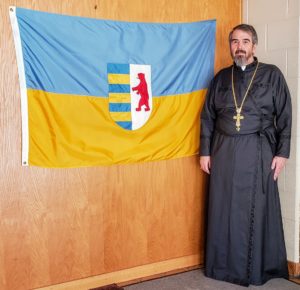
Father James Batcha of St. Michael’s Byzantine Church in Flushing stands beside a Ukrainian flag hanging in the church vestibule. (Photo by Tom Travis)
Father Batcha believes that if the world wants Ukraine to be a NATO nation, the other nations should defend them. As far as Putin is concerned, Father Jim believes, “sanctions mean nothing.”
“I feel bad for the people of Ukraine,” Fr. Batcha said. “They deserve to be independent of Russia. They are not Russian. People need to understand that, they have their own identity.”
Congressman Dan Kildee announces Candle Vigil for Ukraine
Congressman Dan Kildee announced there will be a candle vigil in support of Ukraine on at 7 p.m. Thursday, March 3 at St. Vladimir Ukrainian Catholic Church on West Pasadena, just east of Jennings Road.
Memories of growing up Ukrainian in Flint
Pylypiw recalls as a child attending the north end Ukraine Orthodox church, St. Vladmir’s, now located on Pasadena Ave. in Flint. Pylypiw says Ukrainian people are proud of their heritage. She recalls that growing up, she was often asked if she was Russian.
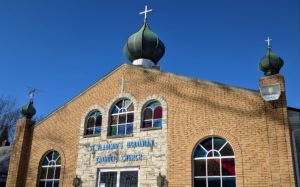
St. Vladmir’s Ukrainian Church located on Pasadena Ave. in Flint. (Photo by Paul Rozykci)
“I would always reply no, I’m Ukrainian and Latvian. And people would look at me like ‘what is that?’ — not knowing that being Ukrainian was a separate identity.”
Zuk was born in Belgium and speaks French, Ukrainian and English. She learned English when she began attending school in Flint. She says French did not as come as easily because she doesn’t use it as much.
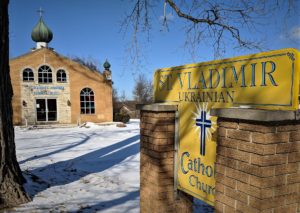
St. Vladmir’s Ukrainian Church located on Pasadena Ave. in Flint. (Photo by Paul Rozykci)
“I don’t have an accent, I don’t know why. When we came to the U.S. we only spoke Ukrainian in the home and then I learned English when I went to school,” Zuk explained.
Ukrainian heritage and community ties in Flint
Zuk recalls at funeral of friend’s daughter about 20 years ago, she and other Ukrainian women and immigrants started talking and eventually started getting together. The group of 16 now call themselves the “refugees” or “the immigrants” and they meet regularly.
Zuk says all but one in the group are immigrants or children of immigrants and 12 of the 16 are Ukrainian. The others are German, Polish and Italian immigrants.
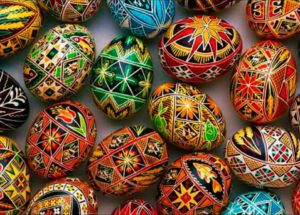
Ukrainians are known for their pysanky which are an art form. These are hand decorated Easter eggs. (Photo submitted by Marie Zuk)
“We try to get together monthly and weren’t able to get together during the pandemic. But we’re all in contact all the time,” Zak says. She explains that when the group gets together there’s always a meal. The group will got together to the Flint Art Fair or the Applewood Gardens or go downtown for a meal.
Martin was not born in Ukraine. She was the first American born in this country after her parents immigrated. Her sister was three when they came to the U.S. They immigrated to the U.S. because of the effects of WWII. Martin explains, “Basically it was the same type of situation as is going on now the Soviet Union was taking control and they needed to leave.”
Ukrainians helping each other
Zuk had spoken with her cousin, a retired pediatrician, in the Ukraine and says she’s “scared to death.” Zuk’s cousin said she has five family members coming from Kyiv, Ukraine to stay with her. They couldn’t get out of town the day they wanted to leave because there was too much traffic. They left during the night and eventually did made it safely out of Kyiv.
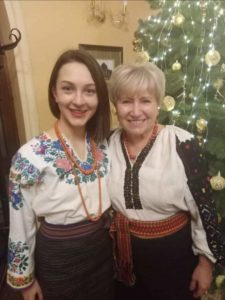
Marie Zuk’s cousin (right) in Lviv, Ukraine standing with her goddaughter. They each are wearing hand embroidered blouses which is traditional Ukraine. (Photo submitted by Marie Zuk)
Zuk asked her cousin, who has a one-bedroom apartment, how she was going to manage having five more people stay with her. Her reply was, “You know. We always make room. We have to help each other.” Zuk recalled that her mother always said, “God put us on earth to help each other and that’s it, you just do that.” Zuk says that is a Ukrainian belief.
A proud and meaningful heritage
Martin, with emotion in her voice, recalled her family spoke Ukrainian in the home until she went to kindergarten and learned English in school. Martin said she last visited the Ukraine around 1989 with her mother to visit her father’s family.
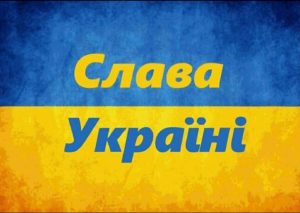
The Ukrainian flag with the blue of the sky and the yellow of the wheat fields with the words meaning Glory to Ukraine. (Photo submitted by Marie Zuk)
Martin told of a meaningful Ukrainians symbol called the Trizub symbol of Freedom (svoboda, Ukrainian pronunciation) “I wear the symbol every day, along with a ‘blessed mother’ medal,” she said.
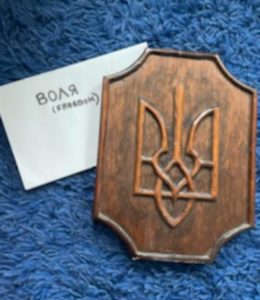
Ukrainian symbol of freedom. (Photo provided by Mary Martin)
Zuk shared about the 16-year-old son of a friend in Virginia who found a Ukrainian flag and wants to display it expressing his pride. “So there’s a pride, a big pride, even in the newer generations,” she says.
Reactions to the war
Pylypiw says their family discussions about the Russian war are tinged with “a lot of anger and sadness.” Her family members in Ukraine plead with her, “Pray for us and contact your government,” she says.
During 1932 and 1933 Stalin took all the crops from the Ukraine fields and used the food to feed the Russian army, Pylypiw states. This was called the holodomor. Nearly 4 million Ukrainians died during the famine. Her father was born in 1925 and lived in the Ukraine during that famine, she says.
Zuk says to put the blame on Putin for this war. She says this war is not about the Russian people. Zuk speculates that Putin is waging this war against Ukraine because of something that happened eight years ago. Zuk utters a Ukrainian word (yimstiticha) and struggles to think of what the English equivalent is. Zuk says that Putin suffers from this yimstiticha and finally decided the closest English word is revenge or a grudge. Zuk says that Putin has this grudge towards Ukraine and “he’s beside himself” because Ukraine forced one of Putin’s puppet leaders out of power about eight years ago.
Zuk said she is not hopeful for the situation in Ukraine. “I’m afraid to be hopeful. I don’t know what’s going to happen. I’m afraid of deals that Zelensky may make with Putin,” she says. “I’m afraid if the fighting goes on, how many more people are going to get killed.”
Martin says Putin is worse than a madman “he’s the devil himself. He wants power.”
Martin describes the landscape as beautiful and because of the fertile soil, there are an abundance of crops. She adds that there also are diamond mines and oil reserves in Ukraine.
Memories of Ukraine
Zuk last visited Ukraine in 1991 and recalls that was when the Soviet Union collapsed. She was visiting a flea market with friends at a stadium. All of a sudden the announcer came over the sound system saying, “The Ukraine is now free. Ukrainian is now the official language.” She says everyone stopped and sang the Ukrainian national hymn. Zuk has visited Ukraine four times.
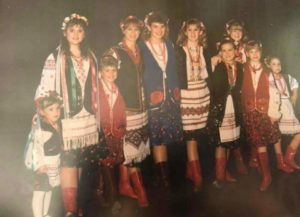
Family members of Mary Martin dressed in traditional Ukraine apparel. (Photo submitted by Mary Martin)
Fr. Batcha says that when people ask him if he’s Ukrainian , he says he’s Carpa-Ruthenian or Western Ukrainian. He speaks the Ruthenian language (a Slavic language that uses the Cyrillic alphabet, the same as Russian and Ukrainian.) and the “church language.” The “church language” is a common language spoken in the mass of all Slavic European churches. Mass is conducted in English at St. Michael’s Byzantine Church.
EVM Managing Editor Tom Travis can be reached at tomntravis@gmail.com.



You must be logged in to post a comment.